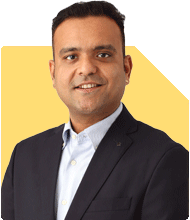Abhishek Shah | Answer |Ask -Follow
HR Expert - Answered on Jul 24, 2023

Hello Sir, I want to change my field from sales to technical. Is it possible? I have done Civil Engineering & done masters in Environmental & Water Resources Engineering. Initially for first three years (of the total 8 yrs of exp) I was in Technical, but then due to some wrong decisions, i moved into sales. Now i want to go back to technical. My current job involves lot of travelling. Now due to family responsibility, it becomes difficult for me to manage travel.
Absolutely, it is possible to transition from sales back to a technical field, especially considering your educational background and previous experience in technical roles. Your background in Civil Engineering and your master's in Environmental & Water Resources Engineering are valuable assets that can be leveraged to pursue a career in the technical domain.
To make a successful transition, here are some steps you can follow:
Identify your target technical field: Determine the specific area within the technical domain that interests you the most and aligns with your educational background. Research different roles, industries, and companies to find the right fit.
Update your technical skills: If there have been any advancements or changes in the technical field since you last worked in it, consider updating your skills. Take relevant courses, attend workshops, or pursue certifications to enhance your knowledge and stay current.
Showcase your technical experience: Even though you have spent several years in sales, don't underestimate the value of the technical experience you gained during the initial three years of your career. Highlight your technical projects, achievements, and responsibilities on your resume to demonstrate your expertise.
Network within the technical community: Reach out to your previous colleagues, alumni network, and other professionals in your desired technical field. Networking can provide valuable insights, job leads, and potential referrals.
Tailor your resume and cover letter: Craft a targeted resume and cover letter that emphasizes your technical skills and how they align with the specific job you are applying for. Address any gaps in your technical experience, explaining how your background makes you uniquely qualified for the role.
Prepare for interviews: Be ready to discuss your technical expertise during interviews. Prepare examples of how your technical skills have contributed to successful projects or problem-solving situations in the past.
Consider a gradual transition: If an immediate shift to a full-time technical role is challenging, explore the possibility of part-time or contract positions in the technical field. This may provide a smoother transition while accommodating your family responsibilities.
Remember, career transitions require determination and persistence. Be patient and open to opportunities that align with your long-term goals. Your mix of technical and sales experience can be a unique advantage in certain technical roles, so position yourself as a versatile candidate ready to make a meaningful impact in the technical domain.
Best of luck with your career transition!
Regards,
Abhishek Shah
You may like to see similar questions and answers below
Ashwini Dasgupta | Answer |Ask -Follow
Personality Development Expert, Career Coach - Answered on Feb 08, 2024
Abhishek Shah | Answer |Ask -Follow
HR Expert - Answered on Jan 07, 2024
Rohit Gupta | Answer |Ask -Follow
Edtech/Online Education Expert - Answered on Feb 09, 2024
Maxim Emmanuel | Answer |Ask -Follow
Soft Skills Trainer - Answered on Mar 21, 2024
Prof Suvasish Mukhopadhyay | Answer |Ask -Follow
Career Counsellor - Answered on May 15, 2025
Nayagam P P |10854 Answers |Ask -Follow
Career Counsellor - Answered on Dec 14, 2025
Radheshyam Zanwar |6744 Answers |Ask -Follow
MHT-CET, IIT-JEE, NEET-UG Expert - Answered on Dec 14, 2025
Radheshyam Zanwar |6744 Answers |Ask -Follow
MHT-CET, IIT-JEE, NEET-UG Expert - Answered on Dec 14, 2025
Dr Dipankar Dutta |1840 Answers |Ask -Follow
Tech Careers and Skill Development Expert - Answered on Dec 14, 2025
Dr Dipankar Dutta |1840 Answers |Ask -Follow
Tech Careers and Skill Development Expert - Answered on Dec 13, 2025
Dr Dipankar Dutta |1840 Answers |Ask -Follow
Tech Careers and Skill Development Expert - Answered on Dec 13, 2025
Mayank Chandel |2575 Answers |Ask -Follow
IIT-JEE, NEET-UG, SAT, CLAT, CA, CS Exam Expert - Answered on Dec 13, 2025
Radheshyam Zanwar |6744 Answers |Ask -Follow
MHT-CET, IIT-JEE, NEET-UG Expert - Answered on Dec 13, 2025
Mayank Chandel |2575 Answers |Ask -Follow
IIT-JEE, NEET-UG, SAT, CLAT, CA, CS Exam Expert - Answered on Dec 13, 2025
Mayank Chandel |2575 Answers |Ask -Follow
IIT-JEE, NEET-UG, SAT, CLAT, CA, CS Exam Expert - Answered on Dec 13, 2025

























